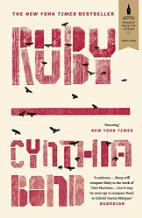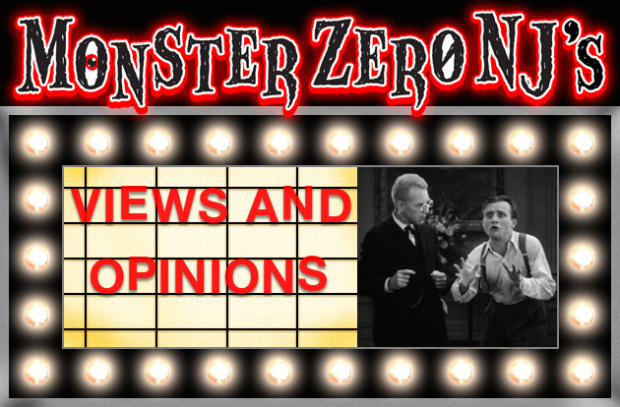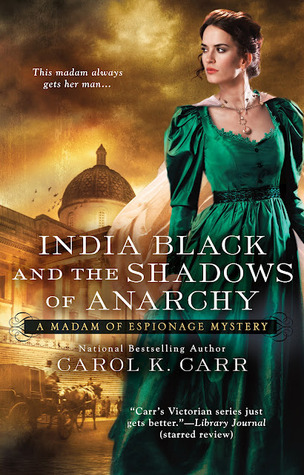
Read 22/07/2017-28/07/2017
Rating: 4 stars
Read for the Reader’s Room Road Trip Challenge
I bought Ruby a while ago, when it was in the running for the Women’s Prize for Fiction. When I hit Texas in the Reader’s Room Road Trip Challenge, its turn to be read finally came.
It’s a story about love and hate, a tale about trying to escape the memories of a place steeped in wrong-doing, where things that happened in childhood form who people are as adults. The place is called Liberty, but there is little that is free about it.
Ruby Bell returns to Liberty from New York City in 1963. She is a glamorous and self-confident woman who attracts the attention of the men who sit and smoke and talk outside the P & K Market. She becomes the subject of ribald gossip and cautionary tales about the dangers of travel and the consequences of sin. Over time she descends into madness. Her appearance changes, she is distracted and reclusive, and most of the people in Liberty avoid her. Apart from one man, Ephram Jennings. Nobody in Liberty looks at Ephram. Nobody notices him except for Ruby.
There will be mild spoilers in this review, but it was difficult to describe it without referring to key plot points.
We learn that both characters have had difficult lives. Ephram’s mother was committed to the state asylum when he was eight years old. His father, a preacher, left soon after, spending most of the year travelling around East Texas to spread the Gospel. Ephram was brought up by his sister, Celia. When he was thirteen, his father was lynched and his body returned. Since then, Ephram has been treated like a child by his sister.
Ruby’s grandfather died when she was young, and she was sent to work for a white woman until she left Liberty for New York as a teenager. There is a shocking history behind Ruby’s youth, something that lingers and taints her. It results in a sense of satisfaction among the other inhabitants of Liberty in witnessing Ruby’s decline on her return.
It’s no wonder that Ruby and Ephram recognise something in each other. Both of them are outsiders in the town as adults, and their connection goes back to childhood.
As children, they first met on a riverbank. Ephram was trying to catch fish when Ruby and her cousin Maggie appeared. Ruby was even then working for the white woman in another town and had an air of difference about her. Ephram fell for her almost instantly. A storm caught them and they ran for the house of a conjure woman called Ma Tante. The house was deserted but their explorations were soon interrupted by Ma Tante returning from her foraging. Ma Tante is a similar character to the medicine man whom Eli Cutter visits as a child in Southern Cross the Dog, and uses similar protective amulets against evil spirits as Stuckey, the looter in the same novel. Ma Tante is Jamaican, but raised by French Creoles in Louisiana.
One of the reasons that I chose to start the Road Trip Challenge in Georgia and work through some of the southern states is because when I read US literature, it tends to be by white writers from states like New York, Pennsylvania, Massachusetts, Illinois. Although I’ve read a few books set in the South, mainly by William Faulkner and Flannery O’Connor, after I read Their Eyes Were Watching God, I wanted to read more books where African Americans were the main characters, or had a large role in the story. I wanted to understand better what the African American experience has been, in order to understand what their current experience is based in. It’s not a perfect way of doing it, I know. I should read more non-fiction by African American writers about the subject. If anyone wants to recommend books to me, feel free to add a comment.
The novel contains much African American folklore and supernatural happenings, but is also full of the treatment of black people by the whites. Ruby’s family history is one of violence. Her mother and aunts are described as passing as white. Black men desire them, but are reluctant to approach them. The eldest sister, Neva, attracts the attention of a prominent white man in town, who takes her as his mistress. His decision to throw over his white wife for Neva leads to all three Bell sisters, even ten year old Girdie, being rounded up by the Sheriff and his posse. Neva is raped and lynched. Charlotte and Girdie are merely raped in a jail cell. Ruby is Charlotte’s child from the rape. Less than a year after Ruby’s birth, Charlotte leaves Liberty for New York City.
The present day in the novel is 1974. Many of the adults were children in the 1930s. All have memories of Klan lynchings. Cynthia Bond doesn’t flinch from describing the horrors of being black and at the violent whim of white men and women with a sense of entitlement, but nor does she go into graphic detail. She leaves just enough space for imagination to pull the knowledge deeper into the reader’s mind.
Ruby can somehow see the ghosts of those killed in lynchings. Somehow she collects their spirits. Her childhood encounter with Ma Tante is her first recognition that this isn’t something imaginary. Ma Tante tries to rid Ruby of the spirits that ride her, but it’s too late. By the time Ruby returns to Liberty, she is a store for the dead, and they are the cause of her madness.
We learn something of Ruby’s life in New York from her memories of that time. She prostitutes herself to make ends meet until she’s employed by a society hostess who throws parties for writers, artists, and rich patrons. She enjoys her life, and the small luxuries it brings her, and regrets the loss when she answers her cousin Maggie’s call for her to return to Liberty. There’s sorrow hidden in that call, and being back in Liberty, at the mercy of her memories, brings Ruby to a low point.
Ephram seeks her out and, instead of behaving in the same way as other men in the township, he is kind and gentle with Ruby. He draws her back from her memories. Those memories are shocking and reveal the truth of Ruby’s time with Miss Barbara, the white woman she goes to work for. Some of what happens to Ruby is brutal, and it shapes her image of herself as well as influencing her life in New York. Again, Bond writes the horrors sensitively, with enough information to shock but holding back from gratuitous detail.
But Ephram’s interest in Ruby leads to attention from the wider town, who decide that Ruby is a vessel of the devil. As the novel moves towards its conclusion, Bond reveals the abuses that have been committed under the cover of occult practices that took place in Liberty over the previous forty years.
Ruby is a tender and yet difficult book. There are things in the novel that I found deeply upsetting and made me sad about the nature of some people. It is a fiction, but there is surely truth behind the African American experience that Bond describes within its pages. There are also moments that balance the sorrow, found in the descriptions of friendships, and in the kindness that lives at Ephram’s heart. I thought it could have ended sooner. The lingering on Ruby and her obsession with the ghosts of children felt a little like Bond was reluctant to let go of the story, but it did conclude eventually, and the conclusion was good.
Advertisements Share this:




